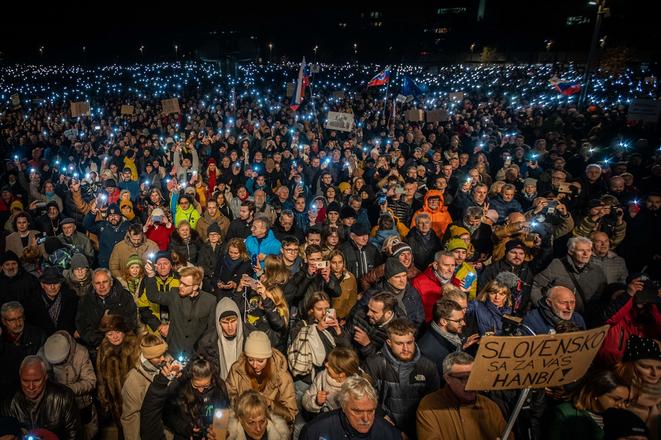Robert Fico did not think there would be protests.
He relied on political fatigue among voters and hoped that his attacks on NGOs, the opposition and journalists would sufficiently deter them from taking a more vigorous stance against his government.
It was supposed to be a lightning fast hijacking of the state - a special operation that would be over by Christmas. But once again the power of civil society presented itself - a civil society that cannot be bribed with Fico's support packages, because it understands that we are witnessing an expensive campaign at the expense of future generations.
The protests will not topple the government and Fico will not resign. But the several thousand-strong crowds have made it clear to Fico that he cannot do anything he wants, and that civil society will not rely solely on the European Commission keeping its word to be more resolute than it was ten years ago with Hungary.
At the same time they are also a message to Europe, one that hinders Fico's efforts to defend his dismantling of the rule of law by saying it is the will of the nation. After all, he clearly told his voters that he would intervene against the police state, strangle whistleblowers, and deal with [Special Prosecutor Daniel] Lipšič. And so he has.
But the governing coalition's crossing of the line is so grave that if society had remained silent, phrases about how Slovaks deserve nothing but Fico would have proved apt.
Moreover, Fico has caught himself in his pre-election trap. At the moment, he cannot attack the tenets of the protests, since he himself fought against the government in the same way in the past, even though his extremely 'quick to forget' voters would forgive him for such a U-turn.
These protests are not about Fico's voters. They send a message, especially to the section of society that was told to get used to the new reality after the election. But now this same section of society is beginning to understand that not only it does not have to get used to it, but it must not.



 More than 10,000 people gathered to protest against government in Bratislava on Tuesday, December 12. (source: SME - Jozef Jakubčo)
More than 10,000 people gathered to protest against government in Bratislava on Tuesday, December 12. (source: SME - Jozef Jakubčo)